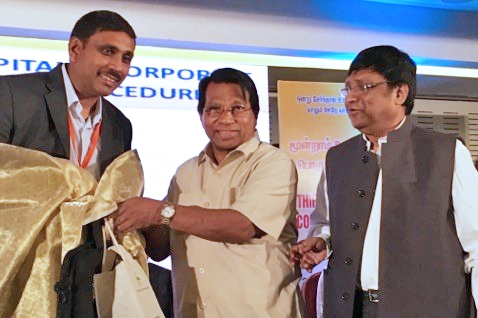
04 Jul The right time to invest in India
As Vice-President of the Australia-Tamil Chamber of Commerce, I recently had the opportunity to speak at the World Tamil Economic Conference in Chennai, India.
With a growing culture of entrepreneurship, many Indian entrepreneurs are looking at raising capital to fund business growth. Sound governance and accounting processes are a crucial to attracting investment so my presentation focused on venture capital, corporate governance and accounting procedures for start-up projects.
India is also becoming increasingly attractive to Asia-Pacific investors due to its fast-growing domestic consumption and economy, favourable demographics and stable government. Here’s why now is a good time to consider investing in India.

The world’s fastest growing economy
India is the world’s fastest-growing economy, holding its own while other markets have seen huge swings stemming from major events including Brexit, intervention in the Chinese stock market by regulators, and central bank stimulus.
Longer term, the outlook also looks positive. Since 2014, India’s GDP has increased around 7.5% yearly and is forecast to grow an average of 6.5% pa to 2023, surpassing China’s forecast growth rate of 5%-7%.
Less vulnerable to global shocks
India is an internally driven economy fuelled by domestic consumption and investment. Inflation is under control, and record high foreign exchange reserves combined with a tamed current account deficit reduces the country’s vulnerability to global economic shocks.
Stable reformist government
The largest democracy in the world, India also boasts a solid rule of law and independent judiciary. The stable Modi Government and central bank are implementing business-friendly reforms such as ‘Make in India’ to encourage manufacturing, and goods and services tax reforms.
Favourable import/export base
India is a major importer of commodities and has benefited from the decline of commodity prices. India’s strongest exports lie in the services sector (making up over 58% of India’s economy in 2015), particularly in knowledge-based services like IT, pharmaceuticals, and engineering goods. India’s population is not only one of the largest in the world, but is also one of the youngest. Two-thirds of its population are under 35 and many speak English, giving the country a significant edge in terms of cost competitiveness and low labour costs.
Fast growth in consumer spending
India is on the path to becoming one of the world’s largest consumer markets by 2025 with consumer spending currently well over US$1 trillion and expected to rise 7.3% annually over the next 20 years. By 2040, nine out of ten Indians will belong to ‘the global middle class’. Indian households are increasingly saving money in stock-based investments like mutual funds as well as investing in the stock market.
An undervalued stock market
Several measures suggest India’s stock market is undervalued. The ratio of the Bombay Stock Exchange SENSEX index of 30 blue chips to GDP currently hovers at 62%, according to GuruFocus.com, well down from the historical high of 158% in late 2007. This figure is closer to its all-time low of 40%, and forecasted to return to strong growth in the coming years.
Risks to consider
In spite of India’s positives, there are still risks that investors must consider.
A currency devaluation in China could impact other emerging market currencies including the Indian rupee. However, the INR has been one of the most stable currencies since the emerging market currency sell-off of August 2013. The Reserve Bank of India, RBI, will likely continue doing whatever it takes to keep the currency stable.
Economists say India is failing to create enough quality jobs to meet the demands of its growing workforce – many people are under-employed, poorly paid or left out of the labor force according to an OECD report. India may not be able to reap the benefits of its demographic advantages owing to high illiteracy rates, little spending on education and many young people not undertaking education or training.
By Vindran Vengadasalam, Accru Felsers Sydney
About the author
Vindran Vengadasalam has strong links with Accru’s partner firms in India, the Australian Tamil Chamber of Commerce and the Australian-Indian community. He undertakes audits for numerous international companies as well as assists Indian businesses in Australia. Clients find his familiarity with the business environment of both countries, language abilities and accounting expertise invaluable for their business ventures. Please contact Vindran if you would like to know more about how he can assist you.
References – Invest in India, Forbes (online), Pine Bridge Investments


